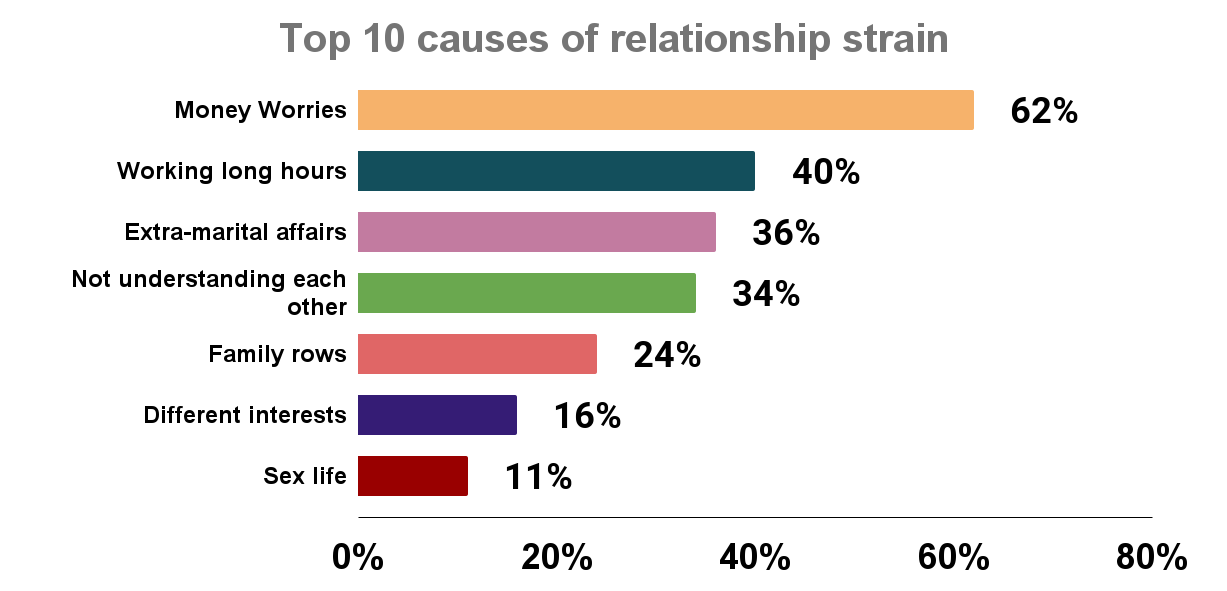Should You Tell Your Partner Everything? - 21 Things You Should and Shouldn’t Talk About and Tips on Doing So
WhatToGetMy Instructional Article
- You know that honesty is the best policy in a relationship, yet you wonder if it is necessary to spill the beans on everything to your partner.
- The answer to this isn't clear-cut. While honest communication in a relationship is preferable, there are several reasons why some things should be better left unsaid.
- Some of the reasons relate to timing, others to your partner's character, and then some have to do with the depth of what you worry about sharing. Read on to get some help navigating the waters of honesty with your partner.
Should you tell your partner everything? Ideally, yes, because a relationship is meant to be a place you can feel safe enough to lay bare everything you are, without feeling judged. You should have a partner that you can confide in because they understand that people have a past, which is just that, the past.
Sadly, even though there are exceptions, this can’t always be the case for the simple reason that humans are emotional beings. Your partner might be unable to handle some of the things you tell them, leading to problems in your relationship. For instance, if you tell your partner all the things you did with your ex, they might develop retroactive jealousy about your past relationships, and trust us, that’s something you don’t want.
Several experts actually agree that there are some things you shouldn’t tell your partner, especially if those things won’t contribute positively to your relationship.
So then what things can you tell your partner, and what are those things you cannot? At the end of the day, this comes down to the dynamics of your relationship because every relationship is different. However, there are some general things that we can advise on, and you can read on to find out.
6 Serious things you should tell your partner
1. Serious mental or physical conditions
Do couples have to tell each other everything? Maybe not, but some things absolutely must be shared with your partner as these can affect the relationship’s stability.
Physical and medical conditions are one such thing. Your partner needs to know if you have any conditions that might affect them. For instance, an inability to have children would enable them to decide if they can still pursue the relationship while it is in its early stages.
Mental conditions such as depression or anxiety should also be discussed to prepare them for times when these conditions will affect you.
It is best to discuss these conditions sooner rather than later to avoid the prospect of the relationship ending at a later date when you would have developed more feelings. Discussing these issues will also allow your partner to give you the relevant support should they decide to stay.
2. Relationship related trauma
Talking about past relationship trauma is another thing that should be discussed with your partner.
Experts say that your partner needs to know of any triggers that remind you of horrible experiences in past relationships that you are yet to get over. This will help them avoid those triggering behaviors to ensure a more peaceful relationship.
Check out How to Get Over a Cheating Husband.

Does the past matter in a relationship? It does when finances are involved. According to the Daily Mail, finances are an essential part of any relationship as they can make or break it. Therefore, your partner needs to know if you’re in any financial troubles such as indebtedness, tax issues, or bankruptcy. This could affect them down the line, so it is only fair that they know about it ahead of time.
Also, feel free to mention the various ways you plan to solve those issues, as this can go a long way in ensuring that they stay in the relationship.
4. Serious events in past relationships
It is healthy to talk about past relationships in terms of any notable events that may have occurred in them. For instance, it would be good for your partner to know if you’ve been married/ engaged before, had kids from previous relationships, or had to suffer through the passing of a partner.
The reason is simple, these events will have affected you personally and will help explain to your partner why you behave the way you do in certain instances.
5. Relationship with your family
Partners are there to support you during the tough times, and this applies to family issues as well. If you have a certain kind of relationship with your family that drains you emotionally, financially, or otherwise, telling your partner about it might not be such a bad idea; it would enable them to better support you when you need it.
In the interest of protecting the family’s integrity, however, you don’t have to tell them everything. Still, a general overview would help them understand the situation better.
6. Criminal record
If you’ve ever been arrested for a crime of some sort, one thing you don’t want is your partner finding out about this from anyone but yourself.
Of course, there are petty crimes that you don’t have to mention unless they come up naturally, but there are more serious crimes that must be discussed. Crimes related to past relationships, for instance, simply must be addressed.
Here are other things you and your partner should know about each other.
10 Things you shouldn’t tell your partner
1. Specific details of your past sex life
Should you tell your partner everything about your past sex life? Absolutely not. This can breed feelings of insecurity and jealousy in your partner and wouldn’t contribute positively in any way to the relationship.
Things they don’t need to know about include:
- The number of people you’ve had sex with (especially if it seems ‘a lot’).
- The specific things you did in bed with others.
- Crazy locations you’ve had sex in.
Unless you have the world’s most confident partner, telling your partner these can have them looking over their shoulder constantly and wondering if they are good enough for you.
2. People you have a crush on
It is okay to keep secrets from your spouse about people you may have a crush on, especially when those people are close to you, either socially or physically.
For instance, sometimes, you might find yourself falling for your partner’s friend, a co-worker, or even a neighbor. It is best to keep this away from your partner to spare them the worry and insecurity that comes with wondering what goes on between you and your crush when they aren’t around.
3. Feelings for your ex
No one wants to hear that their current partner still has feelings for their ex, so this information is best left unsaid should you tell your partner/ spouse everything about your life.
It is quite normal to still harbor feelings for an ex, but we advise that if these feelings are serious enough to impact your current relationship, you should find a way to work through them. Failure to do so could spell disaster for your relationship. Consider reaching out to a therapist if you need to.
4. Things you miss doing with your ex
How to talk about past relationships 101 – don’t mention things you enjoyed doing with your ex. Doing this will, in effect, compare your past relationship with your current one and can lead to feelings of insecurity in your partner.
You are free to suggest doing those things you miss doing, but don’t let your partner know you did this with your ex. This way, you get to satisfy your urges while keeping the relationship safe.
5. Negative feelings towards their family
A person’s family is, in most cases, very dear to them. With this in mind, it is probably best not to tell your partner if you harbor negative feelings towards their family because they might feel like they have to choose between you and them.
Instead, find a way to work through your issues with them on your own or with the help of a therapist. If this doesn’t work, you can then raise the issue with your partner if in a serious relationship because the way you relate with their family will be a massive factor in the longevity of your relationship.
6. Negative feelings your family has towards your partner
If your family has issues with your partner and you’re wondering if you should tell your partner everything, the simple answer is no, you shouldn’t. Doing this can have several adverse effects. For instance, your partner might feel inadequate or even become defensive around your family members, which will only make things worse.
It would therefore be best to keep such things to yourself. We also recommend that you seriously consider why your family might have these issues because they might be seeing something that you don’t. However, if their fears are unfounded, find a way to get them to see that.
7. Snooping around their devices
In preparing for this article, we read through a journal on wedding advice. One story stood out to us, and that was one where a woman had trust issues with her husband. She didn’t trust that he was faithful and so snooped through his phone and laptop. When she found nothing, she confided in her therapist, who told her, “don’t tell your husband everything relating to your discovery.” In other words, she was advised to keep quiet about the snooping.
The reason for this advice was simple: her husband did not need to know that she did not trust him, especially when she had no proof that she shouldn’t. The same applies to relationships, don’t admit to snooping through your partner’s devices to avoid them feeling like they aren’t trusted or that you are insecure.
8. Things that went wrong in past relationships
When you talk about past relationships when dating, it is recommended that you avoid mentioning past mistakes that you made, especially if you have learned from them. If you decide to say these things, be sure that you don’t go too much into detail and that you reassure your partner that you have learned from those mistakes.
9. Infidelity in past relationships
A lady was complaining on a dating forum that her boyfriend keeps bringing up her past relationships whenever he suspects her of cheating because she had admitted to doing so in a past relationship.
One could even argue that he only suspects her of infidelity in the first place because she told him of that past incident. Therefore, our advice to you is that you keep your infidelity stories to yourself because it might be too much to handle for some people.
10. Certain medical procedures
Maybe someday, the answer to the question, “should someone’s past affect their relationship?” will be an honest “no,” but until that day, some things are better left unsaid.
For instance, in conservative nations or if you’re with a conservative partner, you probably shouldn’t mention having done certain medical procedures such as abortions. If you feel your partner can handle it, well and good, but if not, there is really no reason to tell. Even more so if it didn’t affect you physically in any way.
5 Things to consider when sharing things with your partner
1. Timing
Most times, the question isn’t “should you tell your boyfriend/ girlfriend about your past relationships?” but rather when to do so. A new relationship needs time to breathe before being burdened by the past, so you should mention certain things only as time goes by.
You should also abide by the right place and time principle when bringing up the past so that it is well received. For instance, there’s no point in telling your partner something serious from the past at a club when you could do it at home where it is quieter, and there are fewer distractions.
2. Necessity
When wondering if you should tell your spouse everything about your past, you should consider its effect on your relationship. If it is negative, you might want to keep it to yourself.
If, on the other hand, what you have to say will impact the relationship, for instance, physical and medical conditions, then you should probably mention it.
3. Maturity
Consider the sense of maturity that your partner has before you spill the beans on your past life because this will affect how they take what you have to say. You can get a good sense of this by observing previous interactions or bringing up hypotheticals and asking their opinions on it.
If you feel they aren’t mature enough to take everything at once, you can divulge information in stages based on your level of comfort and their level of growth.
Check out Signs of an immature man.
4. Level of trust and love
Should you know about your partner’s past if it isn’t really a serious relationship? No? Then why should they know about yours if that same scenario stands.
You should only reveal important information about your past to someone you are serious with. They should also love you enough to be able to get over anything you have to tell them.
Such a person also needs to be trustworthy because the last thing you want is for them to go around telling others what you told them in confidence either during or after the relationship ends.
5. Set boundaries
Your partner might want to know about certain things that you feel uncomfortable talking about, or things you know will hurt them if you mentioned. In such cases, you should make it clear – in a polite way – that you are uncomfortable discussing those things but that you might be open to doing so in the future.
Frequently Asked Questions
1. Is it okay to not tell your partner everything?
You don’t have to tell your partner everything that goes on in your life because this can lead to codependency in a relationship, which can negatively affect you.
In relation to things about your past, there are also some things that you need not say because they are either inconsequential or will either breed insecurity in your partner – or both.
2. What you should never tell your partner?
Some things you should not tell your partner include:
- You don’t like their family.
- Your family doesn’t like them.
- You cheated in past relationships.
- You were snooping around their devices.
- You have feelings for your ex.
- You miss doing certain things with your ex.
- You have a crush on their friend.
3. Is it OK to keep secrets in a relationship?
It is fine to keep a couple of secrets if you think it would benefit the relationship. If you find, however, that you constantly have to keep secrets from your partner, it is time to reevaluate the relationship because this points to a lack of trust and effective communication.
All in All…
Honesty in a relationship is the best policy, but that doesn’t mean it isn’t subject to conditions. You need to consider the impact talking about your past will have and how best to go about it. This is all dependent on the type of partner you have and what you can discuss with them. Therefore, you should properly think about these before you decide to tell your partner anything about your past.
52 MINUTES
ESTIMATED TIME DESIGNING AND UPLOADING THIS ARTICLE
12 HOURS 05 MINUTES
ESTIMATED TIME RESEARCHING AND WRITING THIS ARTICLE
You Might Also Like

How Do Married Couples Handle Finances: 3 Important Steps
How Do Married Couples Handle Finances: 3 Important Steps WhatToGetMy Instructional Article Unspoken expectations on money management in marriage can affect the quality of your relationship with your spouse. This is why discussions on how to handle finances in marriage should not start in marriage.

How to Deal With a Messy Spouse: 13 Ways to Navigate Living With a Messy Partner
How to Deal With a Messy Spouse: 13 Ways to Navigate Living With a Messy Partner WhatToGetMy Instructional Article If you have just moved in with your significant other and just discovered that they are messy, you are probably wondering how to live with a

7 Legal Things to Do After Getting Married
7 Legal Things to Do After Getting Married WhatToGetMy Instructional Article It is nothing short of thrilling to be in a union with your long-term partner. However, marriage comes with several legal obligations. Discover and learn seven legal things to do after getting married. Marriage

WEDDING GIFT IDEAS FOR WEALTHY COUPLE
When it comes to finding wedding gift ideas for a wealthy couple, it can seem an impossible task because they will already have everything and if they don’t have something they can just go out and buy it for themselves. Wealthy couples, if they have


